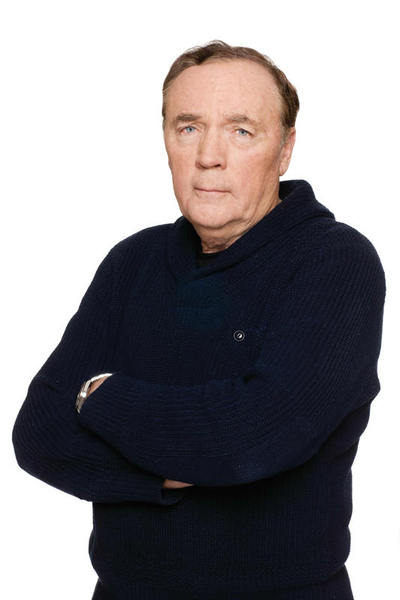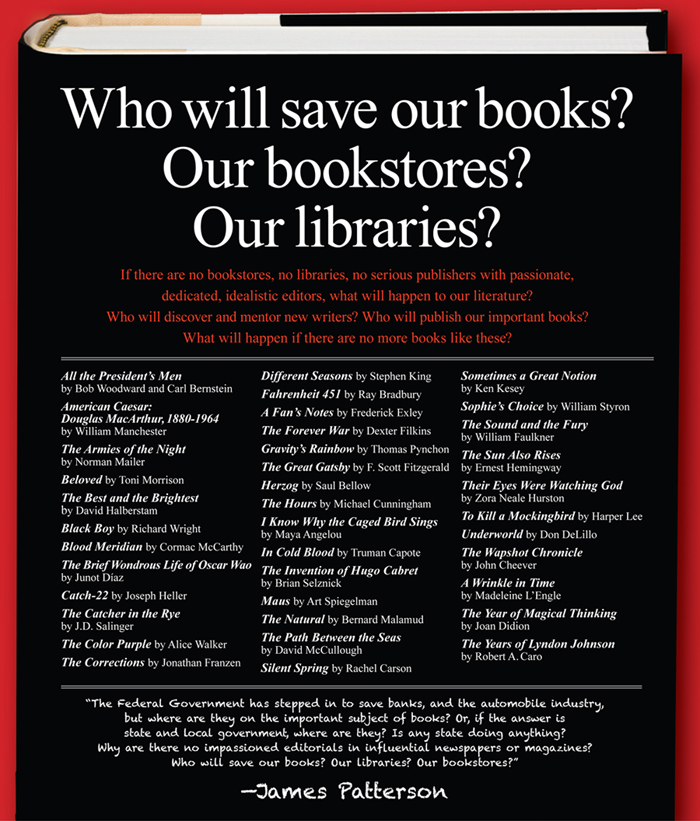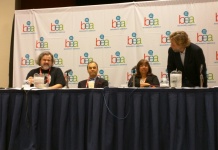 I know I’m coming a bit late to this party, but I was out of town while everyone was discussing James Patterson’s ad. And I’m kind of glad I was. It gave me time to digest what other people were saying and form my own opinions.
I know I’m coming a bit late to this party, but I was out of town while everyone was discussing James Patterson’s ad. And I’m kind of glad I was. It gave me time to digest what other people were saying and form my own opinions.
I wasn’t in favor of the government bailout of the automobile and banking industry, for exactly this reason. We set a precedent. Now people can say, “Well you bailed them out; what about us?” Which is exactly what Patterson alluded to in his ad.
That genie’s out of the bottle. We’re going to see lots more people asking for free government funds in the future, but that’s then. What about Patterson’s request?
It probably won’t come as any surprise that I’m not in favor of it. Joe Konrath made some excellent arguments in his post; I thought his best point was that books are thriving, something Patterson is apparently unaware of. Ask lots of self-published authors, though, and they will say the same thing. Ask readers who can find high quality books at far less than Big Six prices.
But for just a moment, let’s ignore the in-your-face absurdity of the idea and step back and seriously consider it. What would a government bailout of the publishing industry look like? I’ve been pondering it all morning, and I can’t come up with anything sensible to do with the money. Pay authors more? That might be a charitable use of money, but it wouldn’t solve the industry’s problems, nor do I think the government would think it a good use of the money. How about propping up Barnes & Noble? Surely keeping more bookstores in business would be a help to the industry? Again, I don’t think it would solve the long-term problem.
Sue Amazon? Probably not. The Department of Justice had an opportunity to look at Amazon as part of the e-book settlement, and they didn’t. I’m doubting they’ll seek legal action against them now—not unless Amazon does something lawsuit-worthy. And if that happened, it wouldn’t be part of a publishing bailout.
But hey, I don’t need to figure this out—Patterson’s the one who asked for the bailout; I’m sure he’s got some ideas. Salon asked that question in their interview with him about the ad. His answer?
I haven’t thought about it but I’m sure there are things that can be done. There might be tax breaks, there might be limitations on the monopolies in the book business. We haven’t gotten into laws that should or shouldn’t be done in terms of the internet. I’m not sure what needs to happen, but right now, nothing’s happening.
Seriously? He went to all the trouble to place the ad, but he didn’t think about exactly what he was asking for? I’m glad Salon asked the question because that answer undermined his entire point.
You know the old saying, “Be careful what you wish for; you might get it”? Makes me wonder what we might get from this request.



































James Patterson is either one of the most idiotic, dipshit-infested authors working today, or he pulled this stunt entirely for publicity and/or attention-seeking reasons. Probably a little bit of both.
Perhaps start by filing federal criminal copyright infringement charges against Google and its flunky the Hathi Trust, for their project of illegally scanning millions of in-copyright books, in the process shafting both the authors and the publishers.
We also have a problem with both France and the UK. France recently changed its laws to allow piracy by govt agencies and has launched a project to scan and distribute millions of books, most by non-French authors and publishers, all without permission of the rights holders.
In the UK, they’ve launched a photo infringement project, soon to be expanded to books. under new laws in the UK, they’ve decided that UK companies are free to steal any photos they find on the web, as long as they claim to have done a search for the owner. The “search” requirements are jokingly minimal and the penalties for non-compliance even with that are so minimal that there is an incentive to steal.
@Dan, don’t hold back. Tell us how you really feel. 😉 Oh, and those two opinions are definitely not mutually exclusive.
And I completely agree with you. In my opinion, he’s sold out, jumped the shark and just about anything else you’d want to say. I haven’t bought one of his books in years.
In my opinion, James Patterson isn’t a “real” writer anymore, so what he thinks doesn’t even register on my radar.
I haven’t bought a book since I fell for one of his early “co-authored” tomes. His I’m -too-important-to-actually-do-any-writing-grunt-work nonsense shows a total lack of respect for the work real writers do. When he started writing nothing but outlines and then giving his outlines to someone else to write, he lost any credibility whatsoever.
I should have said, “I haven’t bought ONE OF HIS BOOKS since I fell for…”
I’ve bought hundreds of books, not just anything with his brand.
According to Publisher’s Weekly, none of the big-five trade publishers posted a margin of less than 9% in 2012. And more than one publisher (or parent company) said higher sales of e-books is boosting its bottom-line—even if e-books are curtailing revenue growth—and should lead to higher margins in the future. So why should we be bailing out a profitable industry, especially one where all of the big 5 (if you count RH after buying Penguin) are either settling or still in court for anti-trust violations? With 3 out of the 5 companies are subsidiaries of foreign (2 private at that) companies, why would Congress even consider it? Several of the big 5 still refuse to sell ebooks to libraries, so where does that leave a population that has been rapidly adopting ebooks?
Maybe if James Patterson thinks the publishers aren’t making enough, he should accept lower royalties. He’s never going to spend all of the $96 million he made last year, let alone the rest of the royalties I expect he’ll make for the rest of his life even if he never writes(?) another book. The more I hear about this, I too wonder if this is a publicity stunt.
@Bruce. Good data on the health of the industry. Thank you for adding it to the discussion. Yes, it does more and more look like a publicity stunt and a particularly bad one at that. I say bad because it perpetuates the “publishing industry is dying” myth that just won’t die.
James Patterson is an ex-adman and every word out of an adman’s mouth is a lie, including “and” and “the” to borrow a phrase.
That said, I’m concerned about the potential loss of professional publishing, but not for the same reasons as Patterson. The indies write lots of low grade genre fiction and, despite selling lots of books, I’d call Patterson a low grade genre author. What he wants is a lot like protectionism from low cost Chinese imports. He thinks of himself as boutique threatened by Wal-Mart. But he is really just the same stuff with a better label.
Where I’m more worried is the lack of literary fiction, non-fiction, and more polished genre fiction among the indies. David Mamet said he’d self publish and that’s a good sign, but it is still a wasteland for reader who want books with more depth than Patterson or Kornrath.